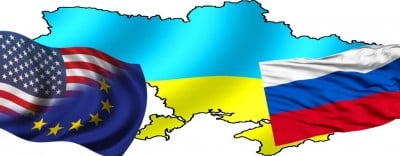Germany to Deploy Combat Troops in Ukraine

On 29 August 1944, the Soviet Red Army ended the Lvov-Sandomierz operation which liberated Western Ukraine from German army occupation. German troops left behind a devastated country. Now, the government in Berlin is moving to deploy German troops to Ukraine for the first time since the Second World War.
On Friday, German Defense Minister Ursula von der Leyen informed the Defence Committee of the government’s plans to massively expand German army (Bundeswehr) missions abroad. The current German training mission in Iraq is to be expanded, in addition to the operations in Ukraine.
According to von der Leyen, the government plans to send a still unknown number of reconnaissance drones to the embattled region of eastern Ukraine. The drones are to be deployed as part of the Organization for Security and Cooperation in Europe (OSCE) mission to monitor the ceasefire between the Ukrainian army and pro-Russian separatists.
The decision is based on an agreement struck between the German Chancellor Angela Merkel and the French President François Hollande on the fringes of the last NATO summit in Wales. In September, the two governments sent a team of observers to clarify details of the operation.
According to a report in the Bild newspaper, the team concluded that at least 150 German soldiers were needed to keep the drones regularly in the air, plus 50 additional armed soldiers to protect the operation.
The possible deployment of German troops comes at a critical time. When it appeared a few weeks ago that Ukrainian armed forces were on the verge of defeat, President Petro Poroshenko negotiated a truce with the separatists. This truce has been violated on a daily basis.
Dozens of people, including many civilians, have been killed in the rebel-held city of Donetsk in the last days by artillery shelling and missiles fired by Ukrainian forces. The Kiev government says that the attacks were carried out by rogue forces over which it had no control. The rebels report, however, that either the Kiev regime had lost control over sections of its troops drawn from private battalions, or that Kiev had deliberately broken the ceasefire.
German troops will not take a neutral position in war-torn eastern Ukraine. Along with the US, the German government was a driving force behind the coup in February to overthrow the government of President Viktor Yanukovych. Since then it has offered strong support to the regime in Kiev, which in turn relies on fascist forces. It comes as no surprise, therefore, that Ukrainian Foreign Minister Pavlo Klimkin enthusiastically welcomed the German offer to deploy drones.
The OSCE includes Russia, and any expansion of its mandate would require the agreement of all 57 member states. OSCE spokeswoman Natacha Rajakovic, therefore, described any possible German-French intervention as “speculation”. In particular, any use of armed troops is likely to be resisted. The OSCE up to now has insisted that its mission in Ukraine is of an unarmed, civilian character.
On Monday, however, the French news agency AFP announced that two of a total of four drones had already been sent to Ukraine.
It would not be the first time that Germany has used the OSCE as a cover for its own military operations in Ukraine. In April, a group of 13 soldiers led by four German officers were accused of espionage activities by pro-Russian separatists. Germany claimed that the arrested soldiers were part of a civilian OSCE mission in the country, which the OSCE firmly denied.
In September, three German soldiers were involved in NATO maneuvers in Western Ukraine.
The new NATO Secretary General Jens Stoltenberg made his first official trip to Poland on Monday and publicly threatened Russia. Stoltenberg said that NATO could deploy its forces wherever it wanted, essentially rejecting a treaty signed with Russia in 1997 that prohibits the permanent stationing of NATO troops on the borders of Russia.
In addition to the Ukraine mission, von der Leyen also announced an expansion of the German army’s deployment in Iraq. The government is planning to establish an outpost in the northern Iraqi Kurdish capital of Erbil, where the Bundeswehr is to train Iraqi and Kurdish soldiers. German officers will also support the Iraqi Joint Staff.
The training center would be part of a network of eight to twelve such camps intended to officially augment the US-offensive against the Islamic State of Iraq and Syria (ISIS). In reality, the air strikes by the US-led coalition and the equipping of Iraq and the Kurds are primarily directed against the Syrian regime of Bashar al-Assad, while ensuring American dominance in the region.
The German ruling class is determined to increase its participation in the new war in the Middle East to make sure its interests are also represented.
The expansion of Bundeswehr operations abroad is the next stage of a comprehensive campaign to militarize Germany. Earlier this year, the Berlin government announced the end of all military restraint. Since then it has systematically worked on the implementation of these plans.
In the last few weeks, there has been an unceasing campaign in political circles and the media devoted to demonstrating the apparent disastrous condition of the army and the necessity for a huge increase in military spending. A report was published by the KPMG consulting firm on Monday, listing the problems and deficiencies in major arms projects. The order for the report was given by von der Leyen in February.
Von der Leyen used the report and the announcements of the new military missions to argue for a massive increase in the defense budget. On Sunday, the defence minister declared that the crises all over the world “demand that we take responsibility.”
In prose recalling the German satirist Karl Valentin, von der Leyen declared: “We are, I believe, all aware of how urgently Germany responsibility is needed in this difficult, crisis-ridden world. That means we will also have to invest in it, and that costs money.”

